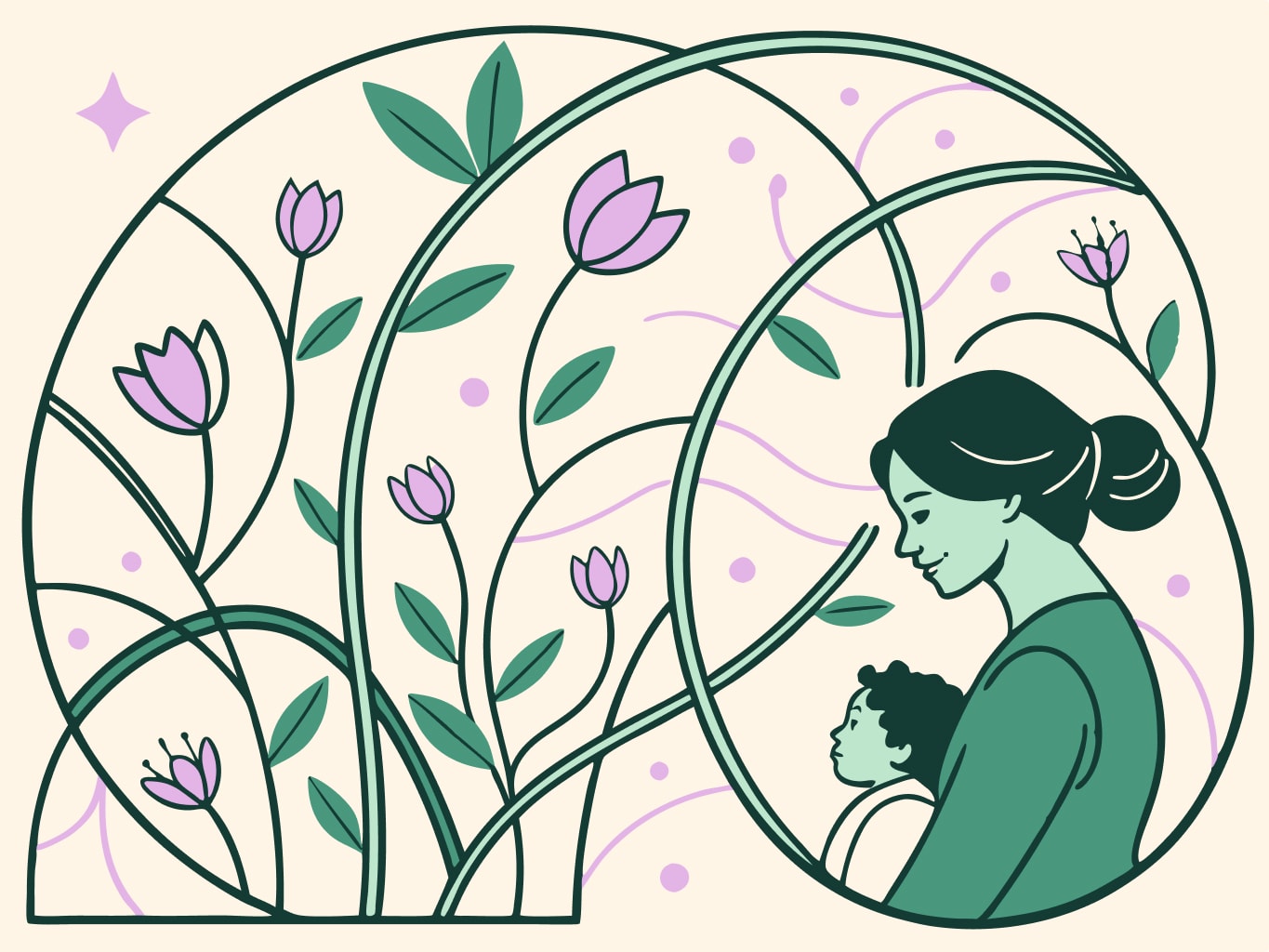A catch-all phrase for the stress and frustration that new parents are likely to experience early post-pregnancy. Here’s what you need to know about it.
What are baby blues?
The term “baby blues” or maternity blues refers to a condition that many new mums experience within the first week of having a baby. It’s feelings of sadness, anxiety, low mood symptoms, and emotional ups and downs, often with mood swings, tears, and irritability.
The baby blues are a normal, temporary response to the significant hormonal changes physical and emotional changes that occur after childbirth.
Why we need to acknowledge baby blues
While the baby blues are common and normal, there are things you can do to recognise these symptoms and get support if they continue. By accepting the baby blues as a real experience, new mums can connect with others who have been through the same, which can prevent feeling of isolation, guilt and shame.
Key Highlight
Baby blues are a normal part of early parenting, affecting up to 80% of birthing parents and new fathers in the first week after birth. Think of it as your mind and body adjusting to one of life’s biggest changes.

Signs and symptoms of baby blues
Baby blues, also known as postpartum blues, is a common condition that affects many new mothers. The signs and symptoms of baby blues can vary from woman to woman, but common symptoms include:
- Mood swings: Feeling happy one moment and sad the next.
- Tearfulness: Crying easily or feeling like you’re on the verge of tears.
- Anxiety: Feeling worried or anxious about your baby’s health or your ability to care for them.
- Difficulty sleeping: Having trouble falling asleep or staying asleep, even when your baby is sleeping.
- Fatigue: Feeling extremely tired or exhausted.
- Irritability: Feeling short-tempered or impatient with your baby, partner, or others.
- Physical symptoms: Headaches, muscle aches, or stomach problems.
These symptoms are usually mild and short lived, lasting only a few days to a week after birth. But if your symptoms are severe or last more than two weeks, they may be indicative of depression symptoms and require professional attention.
How long does baby blues last?
Baby blues generally start between three to five days after the birth of a baby and can last for up to two weeks.
Baby blues usually resolve within the first two weeks of adjusting to your new baby’s arrival. However, this is a personal and individual experience and sometimes can extend depending on your physical, emotional and personal situation.
If they’re becoming more intense rather than getting better, you might be experiencing postnatal depression.
Risk Factors Influencing the Length of Baby Blues
The length of baby blues can vary from person to person. Several factors can affect how long it goes for:
- Sleep deprivation: Lack of sleep and fatigue can exacerbate symptoms of the baby blues.
- Support system: Having a strong support system, including a partner, family, and friends, can help alleviate symptoms and shorten the duration of the baby blues.
- Previous mental health history: Women with a history of mental health disorders, such as depression or anxiety, may be more likely to experience a longer duration of the baby blues.
- Physical changes: The physical changes that occur during childbirth and the postpartum period, such as pain, discomfort, and fatigue, can contribute to the development and duration of the baby blues.
- Medical issues for yourself or the baby: The experience of giving birth can sometimes involve medical procedures or complications to the baby which may increase the length that you may notice these symptoms.
What’s the difference: Baby blues and postpartum depression
While baby blues and postpartum depression, also known as postnatal depression (PND), might seem similar at first, they’re quite different experiences.
Both baby blues and postnatal depression are types of postpartum mood disorders.
Baby blues appear within the first few days after birth and usually ease within a week. PND, on the other hand, can develop anytime within the first year and has a deeper, longer-lasting impact on both parent and family, often overlapping with other mood disorders .
PND affects around 1 in 5 mothers and can influence how you bond with your baby, your relationships with family, and your overall wellbeing. Unlike baby blues, PND often needs additional support to manage – but it’s important to know that effective help is available.
Your healthcare provider or ForWhen can work with you to find the right combination of support, which might include counselling, medication, or other treatments that suit your specific situation.
Key Highlight
Having baby blues or PND doesn’t mean you’re a bad parent. Both are natural responses to a big life change and seeking help is a sign of strength not weakness.
How is baby blues diagnosed?
It can be very difficult to diagnose baby blues just through symptoms, as symptoms can be similar to many other mental and physical health conditions.
Because of this, it rarely has a formal diagnosis but is used to describe the short, temporary period of a sudden drop in oestrogen and progesterone hormone levels. Providing reassurance and support is crucial for helping parents deal with the baby blues.
How to cope with the baby blues
To work your way through the baby blues, there are some steps you can take. It is important to be open to the feelings and allow time to adjust.
- Take time for yourself and relax with your baby and partner.
- Give yourself time but be sure to recognise if these feelings are persisting and if you need to speak with a medical professional;
- Get plenty of rest and sleep when baby sleeps;
- Ensure that you eat healthy and nutritious foods with a good diet in mind;
- Exercise as part of your normal routine or create a new routine which includes baby;
- Seek support from your partner, family and friends, recognise when you need help, support or companionship.

Developing a bond with your baby
Even in these difficult first few days, spending quality time with your baby, connecting and getting to know one another, develops your own way of communicating together. You can start by:
- Spending time holding and touching your baby
- Talking and singing to your baby
- Enjoy physical contact during nappy changes and feeding
Bonding with your baby doesn’t always happen immediately and can take weeks or even months to develop. It may be beneficial to access additional support from your partner or child health nurse.
Take care of yourself
Allow yourself time to physically recover from your recent pregnancy, delivery and adjusting to being a new parent. Take the time to acknowledge all the changes you are experiencing and appreciate what your body has been through as it continues to change. You can do this by:
- Try to rest when baby sleeps
- Let others do household chores
- Take time to eat and have some healthy snacks on hand
- Accept any help offered with meals
- Sit outside and enjoy some fresh air
- Take your baby for a walk around the block
- Allow time for you and your partner to get to know your new baby
Key Highlight
Slow down. Be in the moment. Rest when you can, accept help when it’s offered, and remember that it’s okay to take time to adjust to your new role.
Lean on family for help and support
Don’t be afraid to ask for help to unpack the dishwasher or accept help that’s been offered. Your family and loved ones will understand this time of adjustment can leave you with less time for these day-to-day things.
It is common to feel like you not managing everything like you used to, no one needs to be a super parent in these first few weeks! You may be surprised at the creative ways your friends and family suggest they could help you.
Make time to have a nap or just rest in a quiet place if you need to, while someone else has a play with your baby.
Build a Support Network
Building a support network is crucial for new parents. Try one or more of these:
- Connect with family and friends: Reach out to loved ones and let them know how you’re feeling. They can offer emotional support, help with household chores, or have a cup of tea together.
- Join a new parent’s group: Your local chid health nurse usually has information on your closest group. There may be either in-person or online options. Sharing your experiences with others who are going through similar challenges can be incredibly helpful.
- Seek professional help: If your symptoms are severe or last longer than two weeks, visit your GP or call health professionals like ForWhen. They can provide support and guidance to get you the right help.
By building a strong support network, you can find the encouragement and assistance you need to navigate this challenging time.
Make time for your relationship with your partner
Allow time for you as a couple to get to know your baby.
Work together to adjust to the new routines and your baby’s needs. It can be hard to talk about your needs when everything is new and you’re both very tired. Try to be kind to each other as you navigate this new normal. You may be experiencing this time quite differently.
When you can, plan a dinner date at home when baby is sleeping. Sometimes getting out of the house for a coffee and a change of scene with the baby helps build this new identity of you as a family.
Staying active & exercising
Start small as your body recovers from giving birth. It could be as simple as breathing or stretching to start with.
Build up to taking your baby around the block as you feel able.
The benefits of serotonin and fresh air helps manage the Baby Blues. You can begin to create a routine that will fit in with the care for your baby.

Helping a new mother with baby blues
If you know someone who’s recently had a baby, understand that baby blues is a normal, very common experience. It’s generally short term and resolves within 2 weeks.
Offering practical help at this time can be hugely beneficial to the whole family. Turning up with meal can mean the world, when nappy changes, sleep and feeding routines are the focus of the new parent’s day.
Providing reassurance that things will get better and a shoulder to cry on can assist the parent to get through this time. A quick SMS every few days to check how your loved one is doing, can provide the support they may need at this time.
Some feelings of a new parent can relate to the birth experience, which could be that it wasn’t what they expected or wanted. Sharing their experience may give you more details than you wish to know (!), but can be beneficial for new parents to tell their story.
If you feel your friend of loved one needs more support, encourage them to reach out to their local Child Health, their GP or call ForWhen to get to the right support.
It is crucial to recognise symptoms of postpartum psychosis and seek immediate medical attention if they occur, as this rare but severe condition requires urgent care.
Can your partner have the baby blues?
As baby blues is due to hormonal changes following a birth, partners do not experience ‘baby blues’. However, they can feel a sense of overwhelm as they adjust to becoming a parent of a small and vulnerable infant and caring for their partner following the birth experience.
If you have experienced a traumatic or long labour or the baby has been born prematurely, this can add to the stress of your partner. How you both manage the changes you are experiencing can impact on your relationship, even if this is not your first child.
Partners may experience anxiety and depression, including impacts of fatigue just like birthing parents. They may be trying to maintain caring for you, the juggles of a new baby in the house and wanting to be seen as coping.
If you notice changes, it’s good to talk together about what you are going through and for you both to seek support from friends or family. If this doesn’t feel comfortable, speak to your GP about what’s going on to get the right support.
For partners it’s also important to have positive networks, exercise, rest, healthy eating, time as a family and accessing services if they have concerns for their emotional wellbeing.
Key Highlight
Parenting is a team effort. Partners can experience anxiety, depression and fatigue too – especially after a tough birth or adjusting to the new family dynamic. Support is available and important for the whole family.
When to seek medical treatment
If you are feeling that your baby blues are persisting and last longer than a couple of weeks, make an appointment to see your GP before your 6 week postnatal visit to check whether postpartum depression may be the cause of your mood swings and emotional lows.
If you are experiencing severe insomnia, are having unusual thoughts or really struggling to cope, it is important to see a GP urgently or attend your local Emergency Department.

Key Messages
If you are experiencing baby blues, you are not alone, up to 80% of birthing parents can be affected and it’s not at all unusual to feel this way following the arrival of your new baby.
There is no wrong or right way to work through this experience as a new parent, you will find ways to adjust that work for you and your new family.
Try not to compare yourself to others and know that it is normal to seek additional support as the role of a new parent is demanding and will result in the impacts of fatigue.
Don’t take for granted the changes you personally are adjusting to always ensure that you talk to your partner or your trusted circle of family, friends and support network about how you feel.
If you’re looking for services that may help, call ForWhen to have a chat about what may suit you.
Frequently Asked Questions
See below our answers to some of the most commonly asked questions we receive about baby blues.
Baby blues generally start between three to ten days after the birth of a baby and can last up to three days.
Baby blues usually resolves itself within the first two weeks of adjusting to your new baby’s arrival, however this is a personal and individual experience and sometimes can extend itself depending on your physical, emotional and personal situation.
All postpartum women experience a mix of emotions and hormones that may contribute to crying or tearfulness. Your homones are changing a lot post pregnancy, and you may be experiencing a mild depression known as baby blues, this is a common post-partum experience.
If you’re feeling unhappy with your mood swings and emotional lows, talk to your doctor. It might be postpartum depression rather than baby blues, which can last longer than two weeks and entails more severe symptoms and mental disorders.

